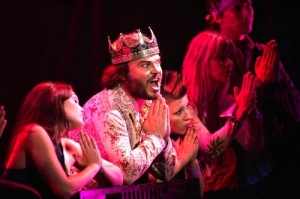 6th Midweek in Lent
6th Midweek in Lent
II Kings 19:8-19 & Luke 23:1-12
The Christian faith has such a checkered history in relation to the powers that be. We’ve been up…and we’ve been down.
Christianity has rubbed shoulders comfortably with the power brokers—the political movers and shakers, the presidents and prime ministers, the kings and queens and Kaisers and Czars and Caesars through the centuries. And power certainly does have its advantages!
From the Roman Emperor Constantine into the modern era, wherever Church and State have walked arm in arm and worked hand in hand, great good things have flourished. Law and justice for every strata of society has developed. Culture has been enriched through art and music and literature. Education has prospered. And the world of science and medicine has had profound allies when Church and State have worked hand in hand, arm in arm. It is the glory of our western civilization!
Ah…but at what cost? For power corrupts…power always corrupts. And wherever Church and State have walked arm in arm for good, there has also been left in their wake religious abuse, religious corruptions, inquisitions, burnings at the stake, hangings of witches, and wars of religion where differences were settled not by theological debate but by the sword. It is the dark side of our western civilization.
Oh, but we Christians have also been on the business end of the sword! We have been on the bottom side of that power. The first three centuries A.D. were centuries of persecution and martyrdom for untold numbers of Christians. Kings and Queens, Emperors and Potentates of all kinds abused and tortured, tormented and killed Christians for sport, for fear, for no reason at all except that they could.
And yet…yet throughout history wherever and whenever power has turned against the Christian faith, it has not spelled our demise. From the early centuries to the present day, what the early Christian theologian Tertullian said has been true: “The blood of the martyrs is the seed of the Church.” And the more the blood of Christians was shed, the more others became Christian.
It happened with the Romans…until even the emperor became Christian. It happened under the Ottoman Turks. It happened in Communist Eastern Europe and Russia. It’s happening now under the power of Muslim dominated populations. Where the sword has shed Christian blood, the Christian faith grows richer, stronger, deeper. It is a mystery of the faith!
But, to say the very least, it does come at a cost. The toll in human suffering and grief is enormous. And all those influences of good in culture, government and human existence neither flourish nor even see the light of day.
So which should we choose? For what should the Church pray? The power to do good…even with the collateral cost of deep corruption? Or the weakness to suffer, that persecutions would come to refine the faith like gold in fire…even at the cost of such great loss? Who would want to choose? Who would dare?
The 20th century theologian, Reinhold Niebuhr, once observed, “The final wisdom of life requires not the annulment of incongruity but the achievement of serenity within and above it.” And it was for that profound serenity for which Niebuhr penned the famous prayer, “God, grant me the serenity to accept the things I cannot change, the courage to change the things I can…and the wisdom to know the difference.”
In our text, Jesus has this wisdom. He has an even greater wisdom, for Jesus has power; divine, omnipotent power. Yet here He stands on the receiving end of power’s abuse—Pilate and Herod, two very different tyrants, the one always portrayed as lean and mean, and the other as a buffoon…but both killed without hesitation. And before them, Jesus is silent with one and nearly so with the other. (Which in itself is highly instructive for us, given our Christian tendency these days to be out there yelling and screaming with the worst of them and squandering our influence recklessly in the public square!)
But Jesus knows that His power is made perfect in His weakness. His life will emerge from His death. And so here, now, He who exercised great power over diseases and demons and all creation, now in great weakness He bows His head to the power that will strip Him of His life.
So we Christians are wise to ask neither for power nor for weakness. In wisdom we ask for Jesus. Only Jesus can save us from the corruption that will come when we have power to do good. Only Jesus can strengthen us for the suffering that will come when we, in weakness, are crucified by the world’s power. And only Jesus, only in Jesus do we find that serene wisdom in both as Niebuhr desired!
Where cross the crowded ways of life…crowded with the perils of power and its corruptions…we hear Thy voice, O Son of Man…even in Your silence. We hear Thy voice saying, “I am with you…always!”
Amen
